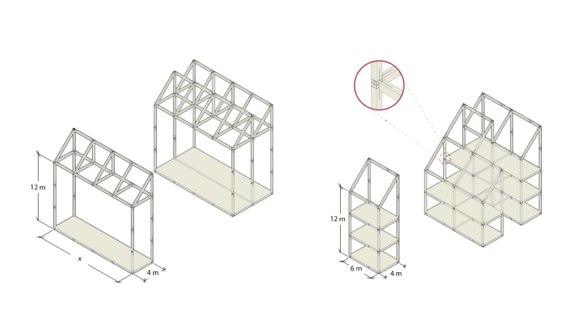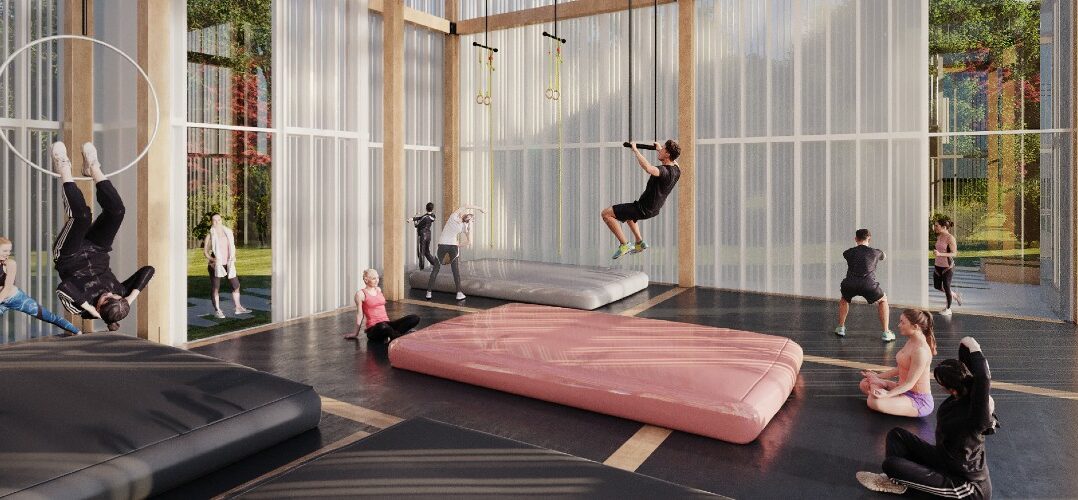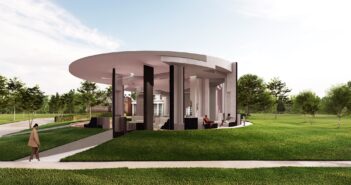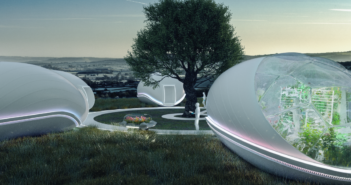When Anna Kulik interviewed Swiss explorer and environmentalist Bertrand Piccard at the MIPIM Leaders’ Perspectives Summit this March, she had already started out on her own venture – Hepp.
Whereas Piccard had taken part in such pioneering feats as making the first solar-powered flight round the world, Kulik’s new venture, was about a different kind of flying – on the trapeze.
‘Hepp’ is what a trapezist calls out as they leap off the platform, bar in hand, high above the people down below. For Kulik, Hepp the company, which she founded and created, and launched last year, provides “sustainable play infrastructure for underutilised urban spaces”.
Performing arts & the circus is the overarching theme at Hepp, currently a start-up at the seed stage. The company swings in two main dimensions: HeppSpace (real estate) and the Hepp programme (wellness and local community).
We’ve created a modular space that is fully adaptable and which can be reused and reassembled in new configurations with a limited amount of maintenance – Anna Kulik, founder & creator of Hepp
HeppSpace offers real estate owners and developers a lightweight, pop-up training & performance space. The space is designed to be net zero carbon, with timber as the prime material. “We’ve created a modular space that is fully adaptable and which can be reused and reassembled in new configurations with a limited amount of maintenance,” says Kulik.
A HeppSpace starts at 480m2, with a height of 12-16 metres. Inside, the space is divided into: HeppDo – for physical wellness, creativity and entertainment (with a programme designed alongside professional artists and circus performers); and HeppCare – for mental health (with a programme designed together with experts in the National Health Service and wellness, and professional circus experts). A sense of play is a core component of both programmes.
“At Hepp, we’re looking to connect different stakeholders, from developers to local authorities, performing artists and the local community, to open the way for them talk to each other to create a circle of engagement,” says Kulik.

The modular approach of HeppSpace offers flexibility
The story behind Hepp
Kulik’s story started when she was on holiday three years ago. Noticing a pop-up circus school in the hotel grounds, she swapped the poolside cocktails for a trapeze bar. There was then no turning back.
Her passion became a business idea while studying for an Executive MBA in San Francisco at Hult International Business School. As part of her studies, she attended a talk given by the founder of The Last Mile, an organisation that teaches coding skills to inmates at San Quentin State Prison in order to help change their lives. “The whole company was driven by the desire to create social good,” recalls Anna.
Combining “the circus and performing arts, together with the built environment and wellness … to create a scalable model to tackle societal needs – Kulik
“My mind started spinning as to how I could combine the circus and performing arts, together with the built environment and wellness, and ultimately to create a scalable model to tackle societal needs,” recalls Kulik. “What would be the gap in the market? Which stakeholders would I need to speak with to start the conversation, and to create that greater value?”
Since then, Kulik has never looked back (or down from the trapeze), switching her career as a project director for London-based Scott Brownrigg to become a real estate entrepreneur.

Anna Kulik, founder & creator of Hepp
Working with Regal London as a first partner
The attractiveness of a HeppSpace for developers is the impermanence, says Kulik. “The space can ‘hop’ in different configurations across undeveloped pieces of land on a construction site, bringing footfall, activity and engagement,” explains Kulik. “Once development is finished, it can then find the most appropriate site to bring a long-term legacy to a project.”
The space can ‘hop’ in different configurations across undeveloped pieces of land on a construction site, bringing footfall, activity and engagement – Kulik
Already Hepp has three sites: one, at concept stage, in Moscow (where Kulik developed several projects during her architectural career), and two in London, where Hepp is working in partnership with developer Regal London, and which are both at feasibility stage.
The first London site is in Wembley, where Regal has bought a large development site for a £270m mixed-tenure ‘beds and sheds scheme’, and the second is in North Finchley. A third London site is also on the horizon.
This summer, Hepp, in partnership with Regal London, applied for an Innovate UK Smart Grant to speed up the development and testing of the HeppSpace. Kulik is also reviewing an opportunity to raise seed investment through angel or venture capital investment, while the third way is to launch by working on a commission-based formula.
Taking the jump to entrepreneurship
MIPIM World also talked with Kulik about being a ‘rising-star’ entrepreneur and what transformation she would like to see in the real estate industry.
What’s it like to launch your own company?
“Being part of a corporate allows you to work at scale, but after this first year with Hepp, I’ve seen that even in a start-up, if you reach out to the right people, you can find amazing opportunities and really make an impact. By ‘smiling and dialling’ you get connections; one person knows another.”
What have been the challenges – and the high moments?
“We’re building a completely new business and a new product. Developing a protype can become a challenge, as can attracting an audience or building the brand; but they’re also our next steps to a successful business. The highs come from when I see people really excited about our idea.”
What is the transformation that you’d like to see in real estate?
“I would love to see more cross-industry partnerships, in particular between private and public stakeholders. I believe we can achieve a completely new model to create value at scale when people talk to each other and are united around the same goal – a genuine legacy creation with people at the heart of the development.”
What are 3 attributes needed to succeed in real estate?
“Grit, persistence and an open mind.”
You’re a regular participant at MIPIM and Propel by MIPIM. What does it bring you?
“MIPIM is a continuous learning opportunity – an opportunity to meet with some phenomenal people.”
How important has mentorship been?
“Mentorship is about creating a safe environment and space, where you feel comfortable to ask questions and search for solutions. I’ve had an incredible amount of support from people over the last year, including a mentor from the Cirque du Soleil, who really helped me when I was about to hit the wall. I learnt from him: take time out and look after yourself… then rise back up and keep going ‘till the fat lady sings’. ”
How does flying the trapeze help with mental wellbeing?
“The biggest mind shift is to move from a completely closed perception of ‘I can’t do this’, ‘I’m not flexible enough’, ‘I’m not strong enough’ to one of ‘I wonder what else I can do?’ On the trapeze, it’s all about timing, setting off from the platform and doing your trick at the very lightest point in your swing. When you break the physical biases about your body, your mental biases tend to go as well. This is the most powerful thing about the circus.”
How do you maintain your mental resilience?
During lockdown, I started taking quiet time, which was unusual for me as I always took myself to be an extrovert. Playing the piano brought me a lot of internal peace. Now that London has opened up, I’m back on the flying trapeze. Anything creative, or physical, that requires effort, attention and focus makes me forget the thoughts spinning in my head.”
Trapeze artists like to learn new tricks. For Kulik, it’s the triple layout. “I’ve still got a way to go, but this is what the ultimate freedom must feel like,” says Kulik.
If you check out the triple layout move online, then you’ll see that most of us are still caught in the ‘I-can’t-do-this’ phase.
See who’s speaking at this September edition of MIPIM in Cannes. It’s time to reconnect!



